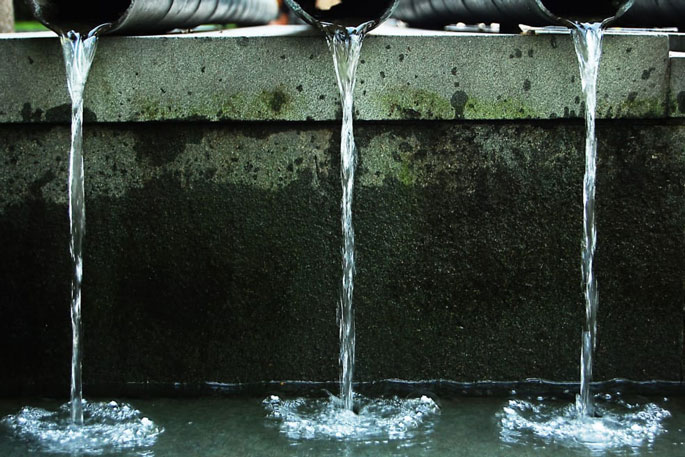The government's Three Waters project is moving from four entities to 10 with its start date pushed out by two years.
Ironically, its move to rebrand the project as the "Affordable Water Reforms" comes with a bigger pricetag for ratepayers than under the old model.
The government says the change will mean individual councils will have a bigger say over the water service entities.
 Photo: RNZ / Samuel Rillstone.
Photo: RNZ / Samuel Rillstone.In a statement, Local Government Minister Kieran McAnulty says the entities will also start delivering water services from July 1, 2026, at the latest, two years after the 2024 start date promised by his predecessor.
Hipkins had tasked McAnulty - who took over the portfolio from Nanaia Mahuta after Hipkins became prime minister - with taking the reform programme back to the drawing board after fierce backlash from councils and political opponents.
The reforms are aimed at helping curb the costs of upgrading water infrastructure across New Zealand, which was reviewed by the previous National government after the 2016 Havelock North campylobacter outbreak.
The review found annual water rates bills would need to increase by up to $9000 by 2051 to pay the up to $185 billion bill for the necessary upgrades and maintenance, as well as preparing for climate change.
Today's announcement has an update to that figure, suggesting increases of up to $9730 by 2054.
The government now says its 10-entity solution will cut on average up to $5400 off that bill, but that compares to the up to $8200 in estimated savings by 2051 claimed by Nanaia Mahuta under the four-entity model in June 2021.
This means the new model would be delivering what appears to be up to $2800 less in savings to households, but the comparison may not be direct.
Some districts would see much greater savings than the $5400 figure - such as Waitomo, expected to see what would be a $21,500 water bill cut by $18,730 under the reforms, an 87 per cent cut.
McAnulty talks up the benefits of moving to a 10-entity plan.
"Under our proposal to establish 10 entities, New Zealand households will still make big savings," he says.
"The feedback has been overwhelmingly clear that our water infrastructure deficit needs to be addressed now if we're to save households from ballooning bills that will make water unaffordable, but also that the reform programme must be led at a regional level - we have listened closely and absolutely agree.
"By extending the number of publicly owned water entities to 10, every district council in the country will have a say and representation over their local water services entities through regional representative groups."
He says these representative groups will include "a partnership between council representatives and iwi/Māori that will provide strategic oversight and direction to the entities".
Answering media questions, Prime Minister Chris Hipkins says the 50-50 policy for mana whenua and the councils on the representative groups, "it's not co-governance, and it wasn't co-governance".
"There will be regional advisory groups that will include representation from mana whenua and of course representation from every local council.
"The advisory groups are only one form of that, there's also an ability for example for the Te Mana o Te Wai statements, and we've introduced an equivalent for other significant interested parties in water use to also have a say in that."
The prime minister says the modelling suggests fewer groups lead to greater efficiency, "but this is still going to be significantly more efficient than what we're doing now".
McAnulty says he has listened to the feedback from councils and has been working closely with local government leaders ahead of the decision.
"These reforms are absolutely essential. Leaving things as they are will mean an unaffordable rate bill."
About 30 councils banded together under the Communities 4 Local Democracy (C4LD) group to oppose the government's proposals, and in a statement said they were disappointed the government had refused to make meaningful changes.
They say it has been turned into an election issue, rather than seeking consensus.
C4LD co-chairs Helen Worboys and Dan Gordon say New Zealanders will see it is the same plan with a different name.
"Simply adding more entities and changing the name is a desperate attempt to save this plan and attempt to show they've done something with the $100 million they've sunk into this process so far.
"Unfortunately, instead of listening to what communities are asking for, the government once again thinks it knows better and is serving up a reheated version of the same unpalatable, unpopular plan."
-RNZ. Addtional reporting by Russell Palmer/RNZ.
In a nuthsell
· 10 new regionally owned and led public water entities to be established.
· New approach avoids a rates blow out and delivers savings to households between $2,770-$5,400 per year by 2054.
· Entities will be owned by local councils on behalf of the public, and entity borders to be based on existing regional areas.
· Each entity to be run by a professional board, with members appointed on competency and skill.
· Strategic oversight and direction to be provided by local representative groups with every local council in the country, as well as mana whenua, getting a seat at the table.



9 comments
Details
Posted on 13-04-2023 11:36 | By Let's get real
The Devil is in the detail and I'm hoping that one immensely important detail that must be strictly adhered to is stated as "Each entity to be run by a professional board, with members appointed on competency and skill." I don't care who has that competency and skill as long as it is genuine and provable. We don't need talkfests involving people who seem to know little about the management of the most important resource in the country. That just results in additional costs that will be dressed up as "consultation". Millions of dollars of wasted hot air.
Garbage In....Garbage Out
Posted on 13-04-2023 12:08 | By FRANKS
So no change then.......
Yep its election year
Posted on 13-04-2023 12:21 | By an_alias
Yeah have to pretend there are options to the voters. Once elected we will just carry on with ALL the policy that you don't want. They rushed through in 20 hours policy to change the rules and laws for land usage. Giving themselves more power without even letting you have a say. National supported
They'll get this in place...
Posted on 13-04-2023 12:31 | By morepork
...just about the time that the rain stops and it is all rendered moot. Why would you spend billions to be climate dependent, when there is an ocean on the doorstep that can solve the problem of water supply forever? $90 million for a de-salinization plant gradually becomes a more attractive option as we continue to dicker around, without clear plans and viability, allowing water to become another political tool. During the coming heat waves and the "big dry", when water is rationed and the rivers are drying up, will somebody please remember Morepork... I won't be here to say: "I told you so...", but I did :-)
Overit
Posted on 13-04-2023 14:43 | By overit
Three waters should be thrown out with the bath water.
10 Waters!
Posted on 13-04-2023 15:18 | By Shadow1
So…. the government now wants to have 10 regional entities maintaining our water. Can’t any of these clowns see how ridiculous they look. My guess is that about 90% of our councils manage their water infrastructure very well and always have. A few small towns probably can’t afford the plant needed to give their ratepayers great water. For a relatively small figure a team could find which towns these are and deal with the upgrades which should be paid for by Central Government. It’s obvious to me, and it should be to others that the water quality is not the issue. They should man up and give us the real reason. Shadow1.
@morepork
Posted on 13-04-2023 17:58 | By Let's get real
We can agree on that, but common sense is not a requirement for office in NZ. Desalination plants and nuclear power would solve all of our imagined problems, but there will never be the courage to think past the rent-a-mob protesters that base their objections on old technologies. We are a third world country that is desperate to be a world leader as long as we don't have to advance and we can live in the past.
@Let's get real
Posted on 16-04-2023 15:01 | By morepork
Thanks for your post; I sometimes feel very lonely on these issues. At the moment, water is being treated simply as a political tool. You are right on that there is a marked lack of vision and they can't see past outdated technologies ( and recognize that new technologies have made great strides and are no longer as "risky" as may once have been the case, not to mention become much less expensive over time...), but as pressure continues to come on natural supplies of water and energy, you'd think someone might consider a different alternative. The rising generation, who would normally do this, are instead, being brainwashed into woke "greenery" and taught to fear tech solutions instead of understand them.
Old outdated system
Posted on 22-04-2023 12:33 | By k Smith
Our water services are outdated and in need of desperate upgrade all over NZ. We still have pipes made out of asbestos 100 odd years old, wander how much asbestos is in our drinking water? At least something is getting upgraded. Councils over decades have failed to keep our services up to standard.
Leave a Comment
You must be logged in to make a comment.